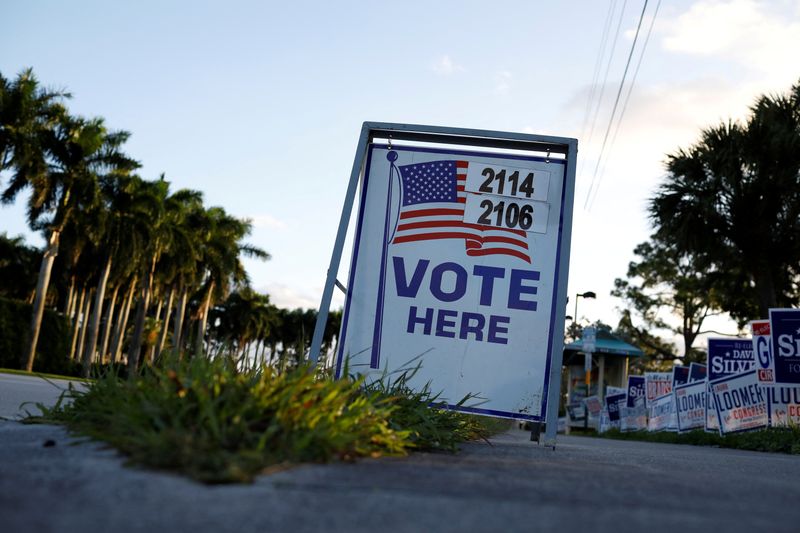By Joseph Ax
(Reuters) - Challenges to election results are not new in the United States. But former President Donald Trump and his allies took things to an extreme in 2020, falsely alleging widespread voter fraud and claiming the presidential contest was stolen.
This year, Trump-aligned candidates such as Kari Lake, the Republican nominee for governor in Arizona, and Doug Mastriano, the Republican nominee for governor in Pennsylvania, refuse to say whether they will accept the results of November's midterm elections, citing the same conspiracy theories about 2020. That has raised fears among election experts that 2022 will see a wave of baseless rejections of vote tallies.
Here's how challenges to November's elections could play out:
RECOUNTS
Vote recounts are relatively common in the United States, particularly in local elections where results can often be close, but they rarely alter the outcome, according to one study.
In 22 states and Washington, D.C., a recount is automatically triggered if the margin of victory is sufficiently narrow, often 0.5%, according to the National Conference of State Legislatures.
In 41 states and Washington, a candidate or voter can request a recount, though some require the vote totals to be within a certain margin. A handful of states do not allow a recount by law; a candidate's only remedy is to file a lawsuit asking a court to order one.
A study by Fair Vote, a nonpartisan group, in 2019 found there had been 31 statewide recounts between 2000 and 2019 out of nearly 6,000 contests, and that just three had changed the outcome.
In 2020, Georgia recounted its votes three separate times, confirming President Joe Biden's statewide victory each time. In Arizona, a Republican-led audit – criticized by experts as methodologically flawed – confirmed Biden's victory nearly a year after the election.
LITIGATION
Post-election lawsuits are a frequent occurrence in the United States, often focusing on procedural issues such as whether mail-in ballots were missing information or arrived on time. But in 2020, Trump allies sought to weaponize the court system even when there was little factual basis undergirding their claims.
Dozens of courts rejected Trump's allegations. But the sheer scope of the effort could encourage Trump-aligned candidates to attempt similar litigation in 2022.
"Because this election denialism has been embraced by so many candidates running for these top state positions, I think we can expect to see a similar barrage of baseless claims of fraud and misconduct in 2022," said Bo Dul, senior counsel at the nonpartisan States United Democracy Center.
Election experts all emphasized that the court system held firm in 2020; indeed, some of Trump's lawyers, including former New York City Mayor Rudy Giuliani, have faced professional punishment for their role in advancing false claims.
CERTIFICATION
Election results are not formal until election officials have certified them, usually weeks after Election Day.
Unlike many other Western countries, U.S. election administration is highly decentralized. The process of certification varies from state to state, but local authorities such as county boards or city officials certify their results first before state officials – typically the secretary of state – certify statewide totals.
That decentralization, election experts said, is a two-edged sword. There are multiple points where a rogue official could disrupt the process – by refusing to certify results, for instance. But the lack of a central authority also makes it difficult for any single actor to alter the outcome.
Then, too, the court system provides a crucial check on malfeasance, the experts said.
Earlier this year, New Mexico offered a preview of what could happen in November. Following the primary election, a Republican-controlled county commission refused to certify the results, citing unfounded conspiracy theories about voting machines.
The commission relented only after the state Supreme Court ordered them to certify the election at the request of New Mexico's secretary of state.
In Pennsylvania, three counties would not certify the May primary election when they refused to count undated ballots, despite being told to do so by the department of state. In August, a state court ordered them to certify. But litigation over the issue of undated ballots is pending before the state Supreme Court.
THE FUTURE
Several election experts said they are more concerned about the 2024 election than 2022, given how many Trump-inspired election deniers are running for key positions this year. A Washington Post analysis found more than half of Republican candidates for Congress and key statewide offices have questioned the 2020 results.
"I'm going to be very scared in 2024 if we have a bunch of these election deniers elected to office," said Rachel Orey, associate director of the elections project at the Bipartisan Policy Center.
Some Republican lawmakers have sought to increase their control of election administration. The Supreme Court is scheduled in December to hear a case in which Republican legislators in North Carolina have asked the justices to prevent state courts from reviewing any election changes made by lawmakers.

While that case will not be resolved in time for the 2022 election, civil rights groups warn that a ruling in North Carolina's favor could theoretically permit state legislatures to throw out presidential results in 2024.
Even if attempts to reverse legitimate election results fail once again, experts said the Jan. 6, 2021, attack on the U.S. Capitol and growing distrust among voters demonstrate how damaging claims about voter fraud can be to American democracy.